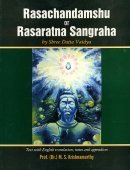Murccha, Mūrcchā: 11 definitions
Introduction:
Murccha means something in Hinduism, Sanskrit, Marathi, Hindi. If you want to know the exact meaning, history, etymology or English translation of this term then check out the descriptions on this page. Add your comment or reference to a book if you want to contribute to this summary article.
Alternative spellings of this word include Murchchha.
In Hinduism
Ayurveda (science of life)
Rasashastra (Alchemy and Herbo-Mineral preparations)
Source: Wisdom Library: Rasa-śāstraMūrcchā (मूर्च्छा) refers to “unconciousness”, a side-effect of the incorrect use of certain metals. It is used throughout Rasaśāstra literature, such as the Rasaprakāśasudhākara.
Unclassified Ayurveda definitions
Source: gurumukhi.ru: Ayurveda glossary of termsMūrcchā (मूर्च्छा):—Partial loss of consciousness; Fainting; Unconciousness

Āyurveda (आयुर्वेद, ayurveda) is a branch of Indian science dealing with medicine, herbalism, taxology, anatomy, surgery, alchemy and related topics. Traditional practice of Āyurveda in ancient India dates back to at least the first millenium BC. Literature is commonly written in Sanskrit using various poetic metres.
Vaishnavism (Vaishava dharma)
Source: Pure Bhakti: Brhad BhagavatamrtamMūrcchā (मूर्च्छा) refers to:—Ecstatic swoon. (cf. Glossary page from Śrī Bṛhad-bhāgavatāmṛta).

Vaishnava (वैष्णव, vaiṣṇava) or vaishnavism (vaiṣṇavism) represents a tradition of Hinduism worshipping Vishnu as the supreme Lord. Similar to the Shaktism and Shaivism traditions, Vaishnavism also developed as an individual movement, famous for its exposition of the dashavatara (‘ten avatars of Vishnu’).
Purana and Itihasa (epic history)
Source: archive.org: Shiva Purana - English TranslationMūrcchā (मूर्च्छा) refers to “becoming unconscious”, according to the Śivapurāṇa 2.3.30 (“The Celebration of Pārvatī’s Return”).—Accordingly, as Brahmā narrated to Nārada: “[...] O sage, on hearing the sweet songs, and seeing the delightful dance, the people entered into raptures of ecstacy. Pārvatī became unconscious (mūrcchā). She saw Śiva’s handsome form, bearing trident and other symbols before her vision. He had smeared the ashes all over His body. He was wearing a garland of bones. His face was beaming with his shining three eyes. He had the sacred thread of a serpent. Exquisitely white in complexion, the handsome lord Śiva, the friend of the distressed, the ocean of mercy was repeating the words ‘Choose the boon (or the bridegroom)’. On seeing Him thus in her mind she bowed to Him. Mentally she had chosen the boon when she had said, ‘Be my husband’.”.

The Purana (पुराण, purāṇas) refers to Sanskrit literature preserving ancient India’s vast cultural history, including historical legends, religious ceremonies, various arts and sciences. The eighteen mahapuranas total over 400,000 shlokas (metrical couplets) and date to at least several centuries BCE.
Languages of India and abroad
Marathi-English dictionary
Source: DDSA: The Molesworth Marathi and English Dictionarymūrcchā (मूर्च्छा).—f (S) Fainting, swooning, syncope.
Source: DDSA: The Aryabhusan school dictionary, Marathi-Englishmūrcchā (मूर्च्छा).—f Fainting. swooning.
Marathi is an Indo-European language having over 70 million native speakers people in (predominantly) Maharashtra India. Marathi, like many other Indo-Aryan languages, evolved from early forms of Prakrit, which itself is a subset of Sanskrit, one of the most ancient languages of the world.
Sanskrit dictionary
Source: DDSA: The practical Sanskrit-English dictionaryMūrcchā (मूर्च्छा).—[murcch-bhāve aṅ]
1) Fainting, swooning; प्रहारमूर्च्छापगमे (prahāramūrcchāpagame) R.7.44.
2) Spiritual ignorance or delusion.
3) A process in calcining metals; मूर्च्छां गतो मृतो वा निदर्शनं पारदोऽत्र रसः (mūrcchāṃ gato mṛto vā nidarśanaṃ pārado'tra rasaḥ) Bv.1.82.
4) The rising of sounds &c; see मूर्च्छन (mūrcchana) (4) above.
5) Growth, increase.
Source: Cologne Digital Sanskrit Dictionaries: Shabda-Sagara Sanskrit-English DictionaryMūrcchā (मूर्च्छा).—f.
(-rcchā) 1. Fainting, loss of consciousness or sense. 2. Delusion. 3. A particular process in calcining metals. E. mūrcchā to be faint, affs. aṅ and ṭāp.
Source: Cologne Digital Sanskrit Dictionaries: Yates Sanskrit-English Dictionary1) Murccha (मुर्च्छ):—(ā) mūrcchati 1. a. To be faint; to increase.
2) Mūrcchā (मूर्च्छा):—(rcchā) 1. f. Idem.
Source: DDSA: Paia-sadda-mahannavo; a comprehensive Prakrit Hindi dictionary (S)Mūrcchā (मूर्च्छा) in the Sanskrit language is related to the Prakrit word: Mucchā.
Sanskrit, also spelled संस्कृतम् (saṃskṛtam), is an ancient language of India commonly seen as the grandmother of the Indo-European language family (even English!). Closely allied with Prakrit and Pali, Sanskrit is more exhaustive in both grammar and terms and has the most extensive collection of literature in the world, greatly surpassing its sister-languages Greek and Latin.
Hindi dictionary
Source: DDSA: A practical Hindi-English dictionaryMūrcchā (मूर्च्छा):—(nf) fainting, swoon, fit state of unconsciousness, syncope; —[ṭūṭanā] to recover from unconsciousness, to come back to senses.
...
See also (Relevant definitions)
Starts with: Murcchagata, Murcchakshepa, Murcchala, Murcchapagama, Murcchaparipluta, Murcchaparita, Murccharoga, Murcchat, Murcchavat, Murcchaya, Murcchayamana, Murchana.
Ends with: Avamurccha, Premamurccha, Sammurccha, Sampurnamurccha.
Full-text: Muccha, Murchana, Muracha, Murtsa, Murcchavat, Murcchala, Ashtakumbha, Sampurnamurccha, Murcchaparita, Murcchaparipluta, Murcchapagama, Murcchakshepa, Mucchita, Murccai, Murcchita, Bhramin, Mrita.
Relevant text
Search found 18 books and stories containing Murccha, Mūrcchā; (plurals include: Murcchas, Mūrcchās). You can also click to the full overview containing English textual excerpts. Below are direct links for the most relevant articles:
Sushruta Samhita, Volume 6: Uttara-tantra (by Kaviraj Kunja Lal Bhishagratna)
Chapter XLVI - Symptoms and Treatment of Fainting fits (Murccha) < [Canto III - Kaya-chikitsa-tantra (internal medicine)]
Brihad Bhagavatamrita (commentary) (by Śrī Śrīmad Bhaktivedānta Nārāyana Gosvāmī Mahārāja)
Verse 2.3.83 < [Chapter 3 - Bhajana (loving service)]
Verse 2.1.80 < [Chapter 1 - Vairāgya (renunciation)]
Verse 2.1.110 < [Chapter 1 - Vairāgya (renunciation)]
Tattvartha Sutra (with commentary) (by Vijay K. Jain)
Verse 7.17 - Definition of parigraha (attachment-to-possessions) < [Chapter 7 - The Five Vows]
Verse 4.21 - Motion, stature, attachment and pride < [Chapter 4 - The Celestial Beings]
Verse 7.13 - Definition of hiṃsā (injury) < [Chapter 7 - The Five Vows]
Hanuman Nataka (critical study) (by Nurima Yeasmin)
Hanuman-Nāṭaka, Act 13 (Summary) < [Chapter 3]
Hanuman-Nāṭaka, Act 12 (Summary) < [Chapter 3]
3. Habit and Custom in the Hanumannāṭaka < [Chapter 5]
Bhakti-rasamrta-sindhu (by Śrīla Rūpa Gosvāmī)
Verse 2.4.185 < [Part 4 - Transient Ecstatic Disturbances (vyābhicāri-bhāva)]
Chaitanya Bhagavata (by Bhumipati Dāsa)
Verse 3.2.476 < [Chapter 2 - Description of the Lord’s Travel Through Bhuvaneśvara and Other Placesto Jagannātha Purī]
Verse 1.16.162 < [Chapter 16 - The Glories of Śrī Haridāsa Ṭhākura]
Verse 3.2.443 < [Chapter 2 - Description of the Lord’s Travel Through Bhuvaneśvara and Other Placesto Jagannātha Purī]
Related products

